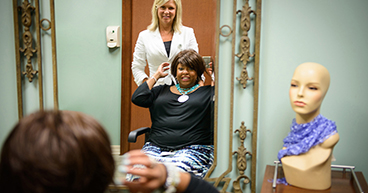
The cancer journey is often described as an emotional roller coaster, and for good reason. Receiving a cancer diagnosis may make you feel sad, fearful, even angry. Preparing for the next medical test may affect your ability to eat, sleep or enjoy the things you used to. Completing the last chemotherapy or radiation treatment may give you an “emotional high” one minute, then leave you feeling drained the next.
But cancer patients don’t need to ride these emotional highs and lows alone. Many hospitals and treatment centers now offer behavioral health care, which helps patients take charge of their emotional health.
“So many things are affected by your psychological or emotional health: mood, outlook, how you approach things and even self-care,” says Diane Schaab, MS, LPC, Behavioral Health Therapist at Cancer Treatment Centers of America® (CTCA), Atlanta. “Mental health may impact cancer patients’ treatment decisions, the ability to complete treatment, and overall quality of life.”
In this article, we’ll answer some of the most common questions and concerns cancer patients may have about behavioral health services. We’ll cover:
- What is behavioral health?
- What is the link between depression and cancer?
- What are common risk factors for depression?
- Are cancer patients at high risk for suicide?
- What treatment options do cancer patients have for depression and other emotional issues?
- What questions should I ask?
If you’d like to learn more about the behavioral health services we offer for cancer patients at CTCA®, or if you’d like to talk with someone about your cancer treatment options, call us or chat online with a member of our team.
What is behavioral health?
Behavioral health recognizes the powerful ways in which emotional, mental, social and behavioral wellness may directly impact a patient’s physical health. It focuses on problem-solving and is designed to provide relief within just a few appointments. Behavioral health practitioners may be psychiatrists, psychologists, psychiatric nurse practitioners, social workers or licensed professional counselors (LPC).
A few of the behavioral health techniques trained CTCA psychotherapists use to help patients cope better and feel better during cancer treatment may include:
- Relaxation and stress reduction exercises, such as deep breathing and muscle relaxation
- Guided discovery, which involves learning to see things from different perspectives, especially ones you may not have considered before
- Cognitive reframing, which teaches you how to reframe negative thoughts so they’re more positive and productive
“Any cancer treatment needs to take a multidisciplinary approach and involve people from different disciplines, and mental health has to be a part of it,” says John Kenny, MD, Psychiatrist at CTCA Phoenix.
Learn how online emotional support can help you through cancer treatment.
Depression and cancer
The most common mental health disorder among cancer patients is depression, which affects one in four people, according to the American Cancer Society (ACS). “We’re used to having freedom and being in control of our lives,” Schaab says. “Physical limitations caused by cancer and its treatment often prevent patients from participating in activities they once enjoyed, which can be a catalyst for depression.”
“Depression and anxiety are part of dealing with cancer for many, if not most, cancer patients,” says Dr. Kenny. But if your symptoms persist or interfere with everyday functioning, you may be dealing with clinical depression, which is a serious mental health condition.
Clinical depression is defined by the National Cancer Institute as having one or more symptoms persist for more than two weeks. Emotional and physical symptoms may include:
- Feelings of sadness that don't go away
- Feeling emotionally numb
- Feeling nervous or shaky
- Having a sense of guilt or feeling unworthy
- Feeling helpless or hopeless, as if life has no meaning
- Feeling short-tempered, moody
- Having a hard time concentrating
- Crying for long periods of time or many times each day
- Loss of pleasure and interest in activities
- Withdrawing or isolating from friends and family
- Gaining or losing weight, not due to illness or treatment
- Sleeping problems, such as not being able to sleep or sleeping too much
- Thinking about hurting or killing yourself
At CTCA, our behavioral health providers meet regularly with patients as part of their treatment plan, helping them navigate the emotional ups and downs that often accompany a cancer diagnosis. So Schaab says she’s seen firsthand how important it is for patients to talk to their cancer care team about any of these symptoms, especially if they’re experiencing them on a regular basis.
The symptoms of depression aren’t the same for everyone, says Schaab. “It can be difficult to discern whether a cancer patient is struggling with depression or whether the symptoms of the cancer diagnosis and treatment are what’s causing behavioral changes,” she says. “A professional counselor is able to assess whether a patient is no longer able to perform a certain activity or whether he or she no longer wants to do the activity because of depression.”
Risk factors for depression
Known risk factors for depression in cancer patients may or may not be related to cancer. Some risk factors include:
- Having uncontrolled pain
- Taking certain medications
- Having a personal or family history of depression
- Having advanced cancer or a poor prognosis
- Not having enough support from family and friends
“During COVID-19 stay-at-home restrictions, cancer patients who relied on family and friends for support and as emotional boosters were more likely to struggle with depression,” says Schaab. “Some cancer patients continue to struggle emotionally during the ‘re-opening,’ including those unable to be vaccinated due to their specific treatment regimen. While friends and family members plan vacations and attend summer gatherings, cancer patients may feel like they need to continue to isolate to avoid health risks. Isolation contributes to depression.”
Suicide risk in cancer patients
Depression among cancer patients is the leading risk factor for suicide, according to a 2019 study published by the National Institutes of Health. The same study shows the suicide rate among cancer patients is about twice as high as that of the general population.
There’s a bright spot, however. New research findings indicate the rate of cancer-related suicide declined 2.8 percent a year between 1999 and 2018 in the United States. Doctors attribute the decline to better mental health care, palliative care, hospice care services, says Xuesong Han, Ph.D., of the American Cancer Society, who led the research suicide among cancer patients.
Treatment options
For cancer patients, early diagnosis and intervention are key in treating depression. “A combination of medication and counseling often yields positive outcomes,” Schaab says.
Medications should be prescribed by your local physician or psychiatrist, who will monitor you for side effects. Be sure to provide a complete list of medications and supplements you’re taking to your prescribing doctor to avoid potential negative interactions.
“Most patients will also need to meet with a therapist weekly, so finding a local licensed professional counselor you’re comfortable with is important,” says Schaab, who suggests asking your primary care doctor or oncologist for a referral.
“Counseling and therapy should be an interactive process where patients take the lead. This empowers you to take control of your mental health,” she says, adding that because there’s a wide variety of mental health strategies, each should be individualized to the patient.
Some of the strategies used by behavioral health therapists at CTCA include:
Cognitive behavioral therapy (CBT): This form of therapy modifies your thought patterns with the goal of changing your mood and behaviors. Through CBT, thoughts are identified, challenged and replaced with more beneficial thoughts and behaviors. For example, someone who enjoys cutting the grass but no longer has the stamina to push a lawn mower recognizes that he or she can still enjoy the pleasure of being outdoors by sitting in a lawn chair as a son or daughter does the mowing.
Coping skills training: Coping skills help you tolerate, reduce and deal with stressful situations. For example, a patient having difficulty concentrating and accomplishing tasks may work with a counselor to break down tasks into individual, small steps. This approach makes goals achievable and reduces stress.
Psychoeducation: This strategy combines elements of CBT, group therapy and education. The goal is to provide a patient with basic knowledge about various facets of depression and its treatment so that he or she can work with a mental health professional for a better overall outcome.
Questions to ask when choosing a therapist
Most therapists have online profiles that provide important information, including certifications, areas of specialization, gender, religion and types of insurance accepted. This is a good place to start in finding a therapist who is a good fit for you. You may also want to call and ask questions about the process or the therapist. Here are a few you may find helpful:
- Do you have experience working with people who have concerns like mine?
- How do you approach helping people?
- Do you make treatment plans? If so, will you share mine with me?
- How do the sessions work? (How long is each appointment? What will we do?)
- How long might I be working with you? (How many sessions do people have with you?)
- How soon should I start feeling better?
- How will we assess my progress?
- What should I do if I don't feel better?
Your cancer journey may often feel like a ride on an emotional roller coaster, so if you or your caregiver is struggling with stress, depression or other emotional issues, don’t hesitate to talk with a doctor or a mental health professional. If you or someone you care for is having thoughts of suicide, contact the National Suicide Prevention Lifeline (1-800-273-8255), which is a 24-hour, seven-day-a-week, confidential resource.
If you’d like to learn more about the behavioral health services we offer for cancer patients at CTCA, or if you’d like to talk with someone about your cancer treatment options, call us or chat online with a member of our team.



